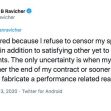St. Paul, Minnesota’s, Hamline University is sprouting renewed questions about the freedom of speech and religion within the academic realm after an October incident with one of its former professors.
In October, a former adjunct art professor with the university taught a class in which she showed a painting depicting the Islamic prophet Muhammed. After showing the painting, the university received student complaints and subsequently denied the professor a renewal of her teaching contract for the next semester. Earlier this week, that professor filed a lawsuit against the university.
The Hamline University controversy has sparked renewed conversations about the limits of the freedom of speech and religion and how those freedoms are expressed in the academic setting.
Erika López Prater, the former adjunct professor, was teaching an art history class in which she sampled religious artwork from across the globe. Reports indicate that López Prater had created a syllabus clearly outlining that students would be looking at prominent religious figures including Islam's Prophet Muhammad among others. The teacher allegedly spent several minutes discussing the reason behind showing the popular 14th-century painting that depicted Prophet Muhammed. The professor also explained in her lawsuit that prior to the class starting, she included the contents of the course in the syllabus alerting students that such content would be shown and discussed. Despite this, the professor found herself at the center of a national conversation about freedom of speech, religion, and Islamophobia.
When López Prater showed the class the painting of Prophet Muhammed, Aram Wedatalla, a Muslim student who was also the president of the university’s Muslim Student Association, was shocked when her professor showed the image of Prophet Muhammad. In the Islamic faith, depicting the Prophet Muhammad is seen as idolatry, and Muslims are prohibited from depicting the Prophet in any artistic form.
After the incident, Wedatalla filed a complaint with the university. The professor is only now filing her lawsuit against the university after her contract was not renewed for the new semester.
After news of the professor's termination dominated national headlines, the university's administration was quick to respond with a statement that explained that the art professor's actions were “undeniably Islamophobic.” Soon after, the university along with the Board of Trustees chair issued a joint statement that followed up on the national outrage that ensued. The joint statement explained that recent “communications, articles, and opinion pieces” prompted the school to “review and reexamine our actions.“
The joint statement explained, “Like all organizations, sometimes we misstep,” referring to their statement that the professor's actions exhibited Islamophobia. “In the interest of hearing from and supporting our Muslim students, language was used that does not reflect our sentiments on academic freedom. Based on all that we have learned, we have determined that our usage of the term ‘Islamophobic’ was therefore flawed."
In her lawsuit, López Prater contends that she showed the images for academic purposes and did not do so in order to harm or insult the Muslim students in the classroom or other faculty and staff throughout the university. On the contrary, the professor argues that the university chose to impose the religious views of Muslim students on other students and employees by siding with the student who filed the complaint. Her lawsuit argues that the university imposed the belief that the depiction of Prophet Muhammad should not be viewed by other students or employees.
The professor also took issue with the University's initial claim that the professor's actions were islamophobic. López Prater’s attorneys shared the reference to being called an islamophobe, saying, “Comments like these, which have now been published in news stories around the globe, will follow Dr. López Prater throughout her career, potentially resulting in her inability to obtain a tenure track position at any institution of higher education."
López Prater explains that prior to the close of the semester, she and the department chair were discussing a new course that López Prater would be teaching. However, after the complaint was made by the Muslim student, the university declined to renew her contract for the upcoming semester.
Following news of the incident, the national civil rights organization for Muslims, the Council on American Islamic Relations (CAIR), held a press conference in which they clarified the professor's behavior was not islamophobic. CAIR argued that professors should be viewed in a different light because they are not the same as “islamophobes who show such images to cause offense.” The organization, however, did stand by this Muslim student who raised her concerns over the professor's choice to show the images to the class.
The student who made the initial complaint to school administrators also spoke during the press conference. She shared, “It just breaks my heart that I have to stand here to tell people that something is Islamophobic and something actually hurts all of us, not only me.”






